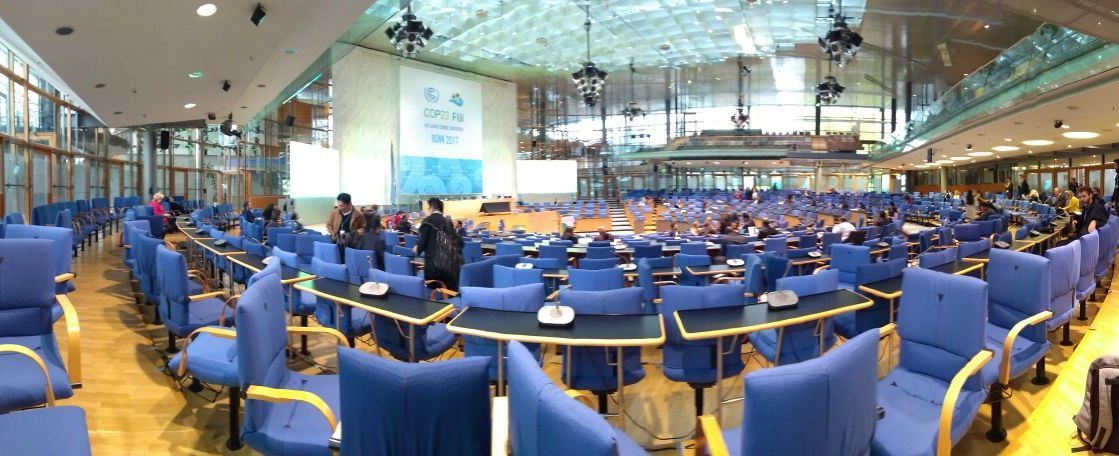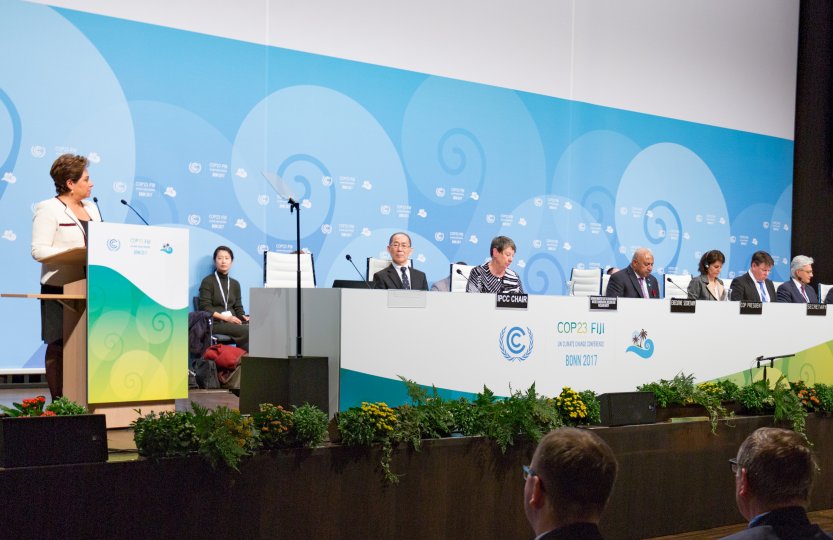Roaming around in the Bula zone of COP 23 in Bonn last week, I found myself wondering who those people are. Sure, first of all there are the delegates representing their parties to the convention, then there is official staff: the UN secretariat and other units, there are media people, employees from NGOs and international organizations accompanied by security and catering personnel. Not to forget also the motivated volunteers as well as the friendly Plant-for-the-planet people handing out chocolate at the entrance every morning: “have a sweet day!”
But among delegates of almost 200 states and more than 16 000 participants in the Bula zone in total, it´s easy to get lost and to lose track. Clearly, you do recognize some faces. Nobody would confuse Schwarzenegger with Al Gore or Merkel with Macron. However, I wanted to get some more profound impressions and decided to get in touch with the people.

“I am here at COP 23, because I think climate change…”
I asked participants to complete this sentence in order to find out about their motivation or ambition, their specific interest in, personal connection to or simply their understanding of climate change itself. The answers I received in these candid interviews were as diverse as you can imagine them to be, if you, more or less randomly, select individuals for a quick chat at a conference where the whole world comes together.
“… is real!”
First of all, it should be noted that climate change “is real”, it “is happening”. These statements might refer to the unbelievable denial of the obvious ongoing environmental variations by the official position of one particular country. Nevertheless, I spoke to a representative from the very nation who described climate change as “an urgent problem we have to deal with”. That´s why we all came together these days in Bonn, because in fact it “is a problem”, it “is a life or death issue for the planet”, but it also can be understood as “the most important justice question of the 21st century”.
“… is a threat.”
Furthermore, people see a threat in the continuing climatic changes. Especially the interviewees from the Small Island Developing States like Antigua and Barbuda, the Bahamas, Micronesia, Nauru, Palau and the Seychelles, expressed that. They attended the COP because of climate change being “the biggest threat to our planet” and “a crucial factor regarding the survival of Small Island Developing States”. On a very personal level, climate change “is threating everyone and everything I love” or “negatively impacts my community and I want decisions that reduce climate change vulnerabilities”. “We are all affected”, but it is these nations who are currently suffering the most from consequences they didn’t cause.

“… is important.”
Actually, climate change is seen as “the most important thing to deal with in our and in future generations”. “Fighting against it´s devastating nature is crucial for mankind”. Therefore, generally all participants at the COP are busy. The time for every statement is limited, decisions will have to be made and even the most protracted negotiations have to come to an end in order to be able to present a satisfying outcome. Considering this, I understand all people who did not want to answer my question.
“… can draw attention.”
An international conference of the magnitude of the UNFCCC COP 23 provides great chances for every participant. You can connect to people from all around the globe and get into touch to important politicians and famous personalities. That’s what makes the COP an excellent platform to draw people’s attention on aspects related to the core topic. For example, on human rights: “climate change and human rights are related to each other and we need to incorporate the rights into the core of the Paris Rule Book”. Other aspects comprise the importance of the “involvement of indigenous people and their traditional knowledge” or the “integration of young people into the decision-making processes”. Ultimately, climate change can be considered to be “paramount of sustainable development”.

“… can be mitigated.”
Some interviewees pointed out solutions and ways to handle the challenges we are facing: “climate change is a critical issue; the impacts must be collaboratively addressed”. “All nations need to take part in order to make a “good life” for all people possible!”. This emphasis on the significance of international cooperation and joint implementations were complemented by personal advice: “climate change can be mitigated with simple ideas, changes of our daily habits and the way we view things”. We need to act now! It’s about you to make a difference.
I thank all my interview partners for their cooperation:
- Mr. Alden Meyer (Director of Strategy and Policy at the Union of Concerned Scientists, USA)
- Ms. Alice Gaustad (Chief Engineer in the Norwegian Environment Agency, Norway)
- Mr. Arana Pyfrom (Technical Advisor at the Office of the Prime Minister, Bahamas)
- Ms. Barbara Hendricks (Federal Minister at the Federal Ministry for the Environment, Nature Conservation, Building and Nuclear Safety, Germany)
- Ms. Brigitte Beyer (Head of Political Staff at the Federal Ministry for Food and Agriculture, Germany)
- Ms. Clara-Luisa Weichelt (Desk Officer for Adaptation, Policy and Global Challenges at MISEREOR, Germany)
- Ms. Doriane Mollard (UNFCCC COP 23 Volunteer, France)
- Mr. F. Umiich Sengebau (Minister of Natural Resources, Environment and Tourism in Palau)
- Ms. Janinka Lutze (Naturefriends International, Germany)
- Ms. Joy S. Juma (Kenya)
- Ms. Mai Tina Ichihara (Climate Change Consultant at the Ministry of Environment, Energy and Climate Change, Seychelles)
- Ms. Mariana Balau Silveira (PUC Minas, Brazil)
- Ms. Mélissa Dumont (University of Lapland)
- Mr. Muawia Hamid Ibrahim Shaddad (University of Khartoum, Sudan)
- Mr. Nawaf Alshatti (Team Leader Maintenance at Kuwait Oil Tanker Company, Kuwait)
- Ms. Patriciah Roy Akullo (Programme Officer for Advocacy at DanAid, Uganda)
- Mr. Roy Harris (Secretary for National Emergency Service, Government of Nauru)
- Ms. Sarah N. Baashan (International Policies Advisor, APA Chair, Ministry of Energy, Industry and Mineral Resources, Saudi Arabia)
- Ms. Shema Roberts nee Nsabimana (Environment Officer at the Ministry of Environment, Antigua and Barbuda)
- Mr. Tesfaye Gashaw Yeshanew (Ministry of Environment, Forest and Climate Change Ethiopia)
- Ms. Tui Shortland (Director at Pacific Indigenous and Local Knowledge Centre of Distinction, New Zealand)
- Mr. Vegard Tørstad (Researcher at the European University Institute, Norway)
- Mr. William N. Kostka (Director Micronesian Conservation Trust, Federated States of Micronesia)









